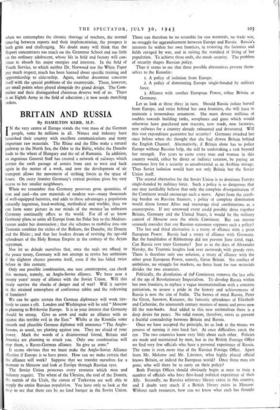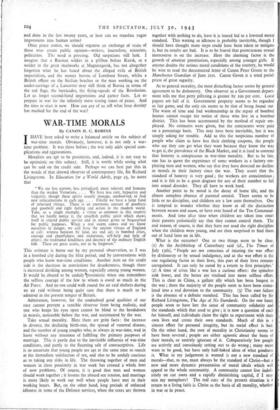BRITAIN AND RUSSIA
By HAMILTON KERR, M.P.
When we remember that Germany possesses great quantities of iron and coal—the raw materials of modern war—many thousands of well-equipped factories, and adds to these advantages a population naturally ingenious, hard-working, methodical and warlike, then we can form some picture in our minds of the menace an unbeaten Germany continually offers to the world. For all of us know Germany plans to unite all Europe from the Polar Sea to the Mediter- ranean under her domination ; that she schemes to mobilise into one Teutonic combine the riches of the Balkans, the Danube, the Donetz and the Rhine ; and that her leaders dream of reviving the age-old splendours of the Holy Roman Empire in the century of the Aryan superman.
Nor let us delude ourselves that, once the seals are affixed to the peace treaty, Germany will not attempt to revive her ambitions if the slightest chance presents itself, even if she has failed twice before in this century.
Only one possible combination, one sure counterpoise, can check this menace, namely, an Anglo-Soviet alliance. We have now a twenty years' treaty of alliance with the Soviet Union. Will this trelty survive the shocks of danger and of war? Will it survive in the strained atmosphere of conference tables and the redrawing of frontiers?
We can be quite certain that German diplomacy will work tire- lessly to cause a rift. London and Washington will be told "Moscow is planning to I3olshevise Europe. It is in your interest that Germany should be strong. Give us arms and make an alliance with us against this terrible evil in the East." Whilst at the Kremlin some smooth and plausible German diplomat will announce "The Anglo- Saxons, as usual, are plotting against you. They are afraid of your power. Mark the words of a disinterested friend, Britain and America are planning to attack you. Only one combination will stop them, a Russo-German alliance. So give us arms."
It seems obvious that we inust make the Anglo-Soviet Alliance effective if Europe is to have peace. How can we make .certain that the alliance will work? Suppose that we transfer ourselves for a moment to Moscow and look at Europe through Russian eyes.
The Soviet Union possesses every resource which man and industry require. The wheat of the Ukraine, the coal of the Donetz, the metals of the Urals, the cotton of Turkestan are well able to supply the entire Russian population. You have only to look at the map to see that there can be no land hunger in the Soviet Union.
There .can therefore be no scramble for raw materials, no trade war, no struggle for aggrandisement between Europe and Russia. Russia's- interests lie within her own frontiers, in restoring the factories and fields ravaged by war, and in raising the standard of living of her population.. To achieve these ends, she needs security. The problem of security shapes Russian policy.
Thus it seems to me that three possible alternatives present them- selves to the Kremlin : 1. A policy of isolation from Europe.
2. A policy of dominating Europe single-handed by military force.
3. Alliance with another European Power, either Britain or Germany.
Let us look at these three in turn. Should Russia isolate herself from Europe, and retire behind her own frontiers, she will have to maintain a tremendous armament. She must devote millions of roubles towards building tanks, aeroplanes and guns which would otherwise have purchased new tractors, new roads, new factories, new railways for a country already exhausted and devastated. Will this vast expenditure guarantee her security? Germany attacked her once before when she thought that she had driven Britain behind the English Channel. Alternatively, if Britain alone has to police Europe without Russian help, she will be undertaking a task beyond her strength. For years to come every man and woman in this country would, either by direct or indirect taxation, be paying an enormous levy for a security as unsubstantial as an Arabian mirage. Thus Soviet isolation would hurt not only Britain but the Soviet Union itself.
The second alternative for the Soviet Union is to dominate Europe single-handed by militaty force. Such a policy is so dangerous that one may justifiably believe that only the complete disorganisation of the Continent would encourage such a move. Apart from the crush- ing burden on Russian finances, a policy of complete domination would alarm former Allies and encourage rival combinations as a counterpoise. If any untoward event could possibly drive together Britain, Germany and the United States, it would be the military control of Moscow over the whole . Continent. But can anyone seriously consider that any Russian statesman supports such a policy?
The last and third alternative is a treaty of alliance with a great European Power. Russia had a treaty of alliance with Germany. But the handshakes of Ribbentrop did not prevent June 22nd, 1941. Can Russia ever trust Germany? Just as in the days of Alexander Nevsky, the Teutonic knights look ever eastwardNwith greedy eyes. There is therefore only one solution, a treaty of alliance with the other great European Power, namely, Great Britain. No conflict of ambitions, no struggle for markets, no fierce hunt for raw materials divides the two countries.
Politically, the dissolution of the Comintern removes the last relic of the age of Revolutionary Imperialism. To develop Russia within her own frontiers, to replace a vague internationalism with a concrete patriotism, to arouse a pride in the history and achievements of Russia is now the aim of Stalin. The heroes of royal Russia, Peter the Great, Suvorov, Kutuzov, the fantastic splendours of Elizabeth and Catherine, the nineteenth century masters of music and prose now fill the text-books. And added to this new nationalism there is a deep desire for peace. No solid reason, therefore, exists to prevent a fruitful comradeship between Britain and Russia.
Once we have accepted the principle, let us look at the means we possess of turning it into hard fact. At once difficulties catch the eye. The two countries know very little about each other. Policies are made and maintained by men, but in the British Foreign Office we find very few officials who have a personal experience of Russia. The same is even more true of the Russian Foreign Office. Apart from Mr. Molotov and Mr. Litvinov, what highly placed official knows Britain, or indeed the European world? Once these men are gone, who will there be to carry on their policy?
Both Foreign Offices should obviously begin at once to train a number of officials who have first-hand political experience of their Ally. Secondly, no Russian reference library exists in this country, and I doubt very much if a British library exists in Moscow. Without such resources, how can we know what each has thought And done in the last twenty years, or how can we translate vague impressions into human terms?
Once peace comes, we should organise an exchange of visits of those who create public opinion—writers, journalists, scientists, politicians. The need is pressing. Old suspicions still lurk. I imagine that a Russian soldier in a pillbox before Kursk, or a welder in the great steelworks at Magnitogorsk, has not altogether forgotten what he has heard about the alleged evils of British imperialism, and the money barons of Lombard Street, whilst a British officer on the Sicilian beaches or the man working on the under-carriage of a Lancaster may still think of Russia in terms of the red flags, the barricades, the firing-squads of the Revolution. Let us forget second-hand impressions and garner facts. Let us prepare in war for the infinitely more testing times of peace. And the time to start is now. How can any of us tell what hour destiny has marked for the end of the war?























 Previous page
Previous page